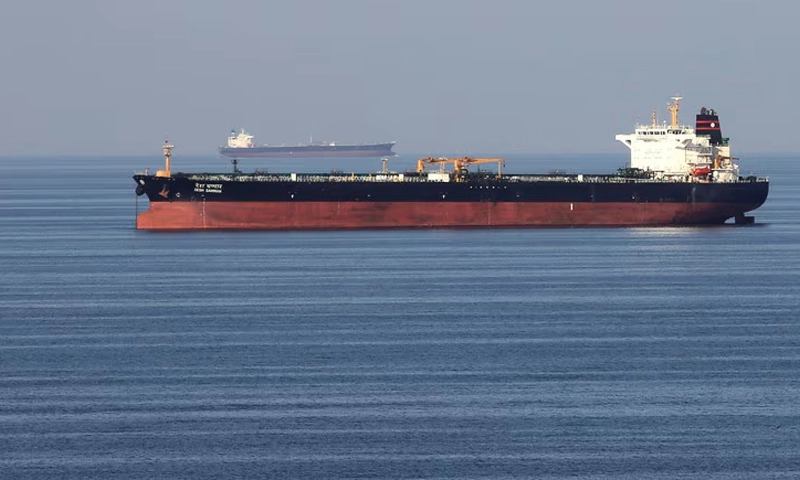- Syed Raza Hassan
- 2 Hours ago

Strait of Hormuz: OPEC sees no need for any action in oil market

VIENNA/ATHENS: OPEC Secretary-General Haitham Al Ghais on Friday said that the escalation between Israel and Iran does not justify any immediate changes to oil supply, as current conditions remain stable.
The latest remarks came on a day which saw oil prices jumping rapidly and some reports suggested that Iran was mulling over blocking the Strait of Hormuz, which will adversely affect global oil supply.
Read more: Israel attack on Iran ‘excellent,’ more to come: Trump
About a fifth of the world’s total oil consumption passes through the strait, or some 18 to 19 million barrels per day (bpd) of oil, condensate and fuel.
EXPENSIVE OIL
Oil prices jumped over $5 on Friday to multi-month highs after Israel launched strikes against Iran, sparking Iranian retaliation and raising worries about a disruption in Middle East oil supplies.
Brent crude futures were up $5.25, or around 7.6 per cent, to $74.61 a barrel at 1215 GMT, after hitting an intraday high of $78.50, the highest since January 27.
US West Texas Intermediate crude was up $5.57, or 8.2 per cent, at $73.61 after hitting $77.62, its highest level since January 21.
Friday’s gains were the largest intraday moves for both contracts since 2022, after Russia’s invasion of Ukraine caused a spike in energy prices.
The National Iranian Oil Refining and Distribution Company said oil refining and storage facilities had not been damaged and continued to operate.
NO DISRUPTION
Goldman Sachs in a note on Friday said while it has incorporated a higher geopolitical risk premium into its adjusted summer 2025 oil price outlook, it continues to assume no disruptions to Middle East oil supply after Israel’s attacks on Iran.
“The key question now is whether this oil rally will last longer than the weekend or a week – our signal is that there is a lower probability of a full-blown war, and the oil price rally will likely encounter resistance,” said Janiv Shah, analyst at Rystad.
“Fundamentals show nearly all Iranian exports going to China, so Chinese discounted purchases would be most at risk here. OPEC+ spare capacity can provide the stabilizing force,” he added.
SHIPPING THROUGH STRAIT OF HORMUZ
On the other hand, the multinational US-led Combined Maritime Force said merchant shipping is continuing to pass through the Strait of Hormuz despite Israel’s large-scale attacks on Iran on Friday, although some ship owners were looking to avoid the region.
Iran has in the past threatened to close the critical Strait of Hormuz to traffic in retaliation for Western pressure. Analysts have said that any closure of the Strait could restrict trade and impact global oil prices.
Read more: Iran to ‘make enemy regret’ attack: president
“The Strait of Hormuz remains open and commercial traffic continues to flow uninterrupted,” the Combined Maritime Force said in advisory, adding that events over the last day had increased the likelihood of regional conflict to “significant”.
“We have reports that more ship owners are now exercising extra caution and are opting to stay away from the Red Sea and the Persian Gulf,” said Jakob Larsen, chief safety & security officer with shipping association BIMCO.
POSSIBLE ESCALATION
If the United States is perceived to be involved in any attacks, “the risk of escalation increases significantly”, Larsen said. “Such an escalation could include missile attacks on ships or laying of sea mines in the Strait (of Hormuz).”
Greece and Britain have advised their merchant shipping fleets to avoid sailing through the Gulf of Aden and to log all voyages through the Strait of Hormuz following Israel’s attacks on Iran, documents seen by Reuters showed.
Greek ship owners were urged to send details of their vessels sailing through the Strait of Hormuz to Greece’s maritime ministry, according to one of the documents issued by Greece’s shipping association, which was sent on Friday.
“Due to developments in the Middle East and the escalation of military actions in the wider region, the (Greek) Ministry of Shipping … urgently calls on shipping companies to send … the details of Greek-owned ships that are sailing in the maritime area of the Strait of Hormuz,” the document said.
All UK-flagged vessels, which include the Gibraltar, Bermuda and Isle of Man ‘red ensign’ registries, were advised to avoid sailing through the southern Red Sea and the Gulf of Aden, a separate document issued by the UK’s transport ministry said.
If sailing through those areas, vessels must adhere to their highest level of security measures and limit the number of crew on deck during voyages, said the advisory, seen by Reuters.
The European Union’s naval mission in the Red Sea, Aspides, is continuing operations as normal but is monitoring developments in the region, an Aspides official told Reuters.






